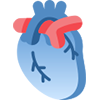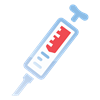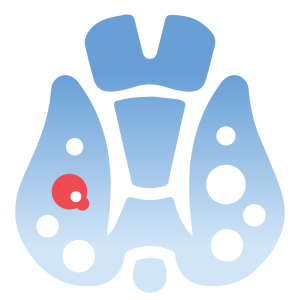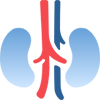Giãn tĩnh mạch thừng tinh là gì?
Giãn tĩnh mạch thừng tinh là tình trạng giãn nở tĩnh mạch trong túi da chứa tinh hoàn (bìu). Tình trạng này tương tự như suy giãn tĩnh mạch chân.
Giãn tĩnh mạch thừng tinh ít gặp ở bé trai dưới 10 tuổi, nhưng thường gặp ở tuổi dậy thì và thanh thiếu niên, và hiếm gặp sau tuổi thanh thiếu niên. Hầu hết tình trạng giãn tĩnh mạch thừng tinh chỉ xảy ra ở bên trái do đường dẫn máu từ tinh hoàn trái. Trong một số trường hợp, tình trạng này cũng có thể xảy ra ở bên phải hoặc cả hai tinh hoàn.
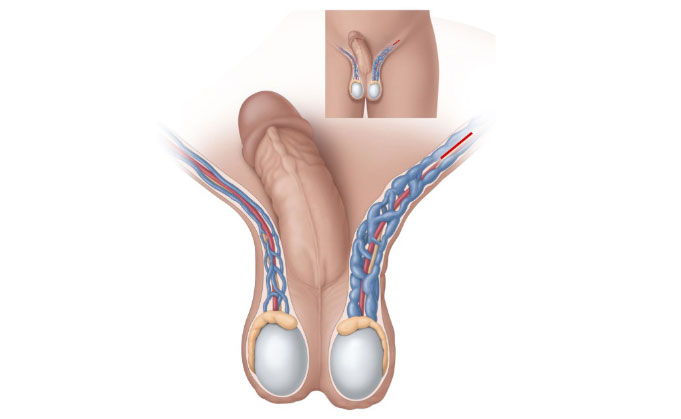
Giãn tĩnh mạch thừng tinh thường xảy ra ở bên trái bìu.
Triệu chứng
Giãn tĩnh mạch thừng tinh thường không có triệu chứng, không gây đau, không gây bất kỳ vấn đề nghiêm trọng nào và không cần điều trị. Tình trạng này có thể được phát hiện bởi bệnh nhân, hay cha mẹ hoặc bác sĩ khi khám sức khỏe định kỳ hoặc trong quá trình đánh giá khả năng sinh sản khi trưởng thành.
điều trị có thể được chỉ định nếu giãn tĩnh mạch thừng tinh:
- Gây đau
- Gây kém phát triển hoặc co rút tinh hoàn (teo tinh hoàn)
- ảnh hưởng đến khả năng làm cha (khả năng sinh sản).
đau hiếm khi xảy ra và nếu có thì:
- Thay đổi từ đau nhói đến đau âm ỉ ở bìu
- đau thêm khi đứng hoặc hoạt động gắng sức
- đau tăng dần trong ngày
- Hết đau khi nằm ngửa.
Co rút tinh hoàn bị ảnh hưởng (teo): phần lớn tinh hoàn được cấu tạo từ các ống sinh tinh. Khi bị tổn thương, do giãn tĩnh mạch thừng tinh, tinh hoàn sẽ co rút và mềm hơn. Nguyên nhân gây co rút tinh hoàn hiện không rõ, nhưng các van bị rối loạn chức năng sẽ làm ứ máu trong các tĩnh mạch. Tình trạng ứ máu này làm tăng áp lực trong tĩnh mạch gây tổn thương tinh hoàn.
Giãn tĩnh mạch thừng tinh có thể ảnh hưởng đến khả năng sinh sản do giảm lưu lượng máu và tăng nhiệt độ của tinh hoàn. điều này có thể ảnh hưởng đến sự hình thành, khả năng di chuyển (độ di động) và chức năng của tinh trùng, do đó tinh hoàn sản xuất ít tinh trùng hơn và tinh trùng được tạo ra có thể không khỏe mạnh. điều trị sớm có thể giúp tạo tinh trùng khỏe mạnh hơn và thậm chí giúp tinh hoàn hồi phục.
Cách thực hiện chẩn đoán?
Thông thường, việc chẩn đoán giãn tĩnh mạch thừng tinh tương đối đơn giản. Bác sĩ sẽ xem xét chi tiết bệnh sử và đặt câu hỏi về các triệu chứng của bệnh nhân, nếu có.
- Việc thăm khám của bác sĩ rất quan trọng để loại trừ hoặc xác nhận tình trạng giãn tĩnh mạch thừng tinh. Bác sĩ sẽ thăm khám cẩn thận bộ phận sinh dục ngoài. Búi tĩnh mạch bị sưng và rối trong bìu mà bác sĩ có thể sờ thấy rõ ở tư thế đứng hoặc khi kéo căng, giúp xác định tình trạng giãn tĩnh mạch thừng tinh. Các tĩnh mạch bị sưng như một “búi giun”. Cả hai tinh hoàn cần được khám để so sánh kích thước. Tinh hoàn bị giãn tĩnh mạch thừng tinh thường nhỏ hơn.
- Khảo sát siêu âm. Tình trạng máu chảy ngược trong tĩnh mạch ở tinh hoàn bị sưng thường được xác nhận qua siêu âm bìu.
Tình trạng giãn tĩnh mạch thừng tinh bên phải đơn độc rất ít gặp. Trong một số trường hợp cực kỳ hiếm, đó có thể do khối u thận gây ra nên cần siêu âm thận để loại trừ.
Phân loại và nguyên nhân
Nguyên nhân gây giãn tĩnh mạch thừng tinh hiện không rõ. Tình trạng này xảy ra khi các van một chiều của tĩnh mạch trong bìu, có tác dụng cho phép dòng máu chảy ngược với trọng lực từ tinh hoàn và bìu trở về tim, bị rối loạn chức năng. Kết quả là làm cho các tĩnh mạch mở rộng (giãn nở) gây giãn tĩnh mạch thừng tinh.
Giãn tĩnh mạch thừng tinh có thể được chia thành 3 mức độ:
- Chỉ có thể sờ thấy bằng tay khi kéo căng (độ i)
- Có thể sờ thấy bằng tay khi thả lỏng (độ ii)
- Có thể nhìn rõ ở khoảng cách xa, ngay cả khi nghỉ ngơi hoàn toàn (độ iii).
Điều trị
Giãn tĩnh mạch thừng tinh có thể được điều trị bằng phẫu thuật hoặc nút mạch, tuy nhiên việc điều trị thường không được chỉ định.
Các trường hợp rõ ràng được chỉ định để điều trị giãn tĩnh mạch thừng tinh ở độ tuổi thanh thiếu niên bao gồm teo tinh hoàn tiến triển, đau, sưng rõ rệt hoặc cơ thể khó chịu, kết quả xét nghiệm tinh dịch đồ bất thường.
Nếu bệnh nhân không có các tiêu chí trên thì không cần phẫu thuật. Bệnh nhân nên khám với bác sĩ hàng năm cho đến khi có thể phân tích tinh trùng.
Phẫu thuật
Phẫu thuật giúp làm tắc tĩnh mạch bị giãn để ngăn dòng máu từ tinh hoàn. Sự tắc nghẽn này làm chuyển hướng dòng máu đến các tĩnh mạch khỏe mạnh. điều này có thể được thực hiện:
- Qua một đường rạch nhỏ ở vùng bẹn bằng phương pháp vi phẫu
- Qua nhiều đường rạch nhỏ với dụng cụ nội soi.
Trong quá trình phẫu thuật, bác sĩ sẽ cố gắng bảo vệ các cơ quan lân cận gọi là mạch bạch huyết. Những cấu trúc nhỏ này thường không thể nhìn thấy bằng mắt thường. Chúng mang bạch huyết, là một chất lỏng trong suốt màu vàng, được lấy ở tất cả các bộ phận của cơ thể. Nếu bị tổn thương, bạch huyết không thể lưu thông đúng cách và có thể gây ra các biến chứng. Phẫu thuật này, gọi là phẫu thuật cắt tĩnh mạch thừng tinh bảo tồn bạch huyết, giúp giảm nguy cơ gây biến chứng.
Các biến chứng thường gặp nhất sau phẫu thuật?
- Tích tụ dịch trong bìu quanh tinh hoàn (gây tràn dịch màng tinh hoàn).
- Co rút tinh hoàn (teo tinh hoàn).
- Giảm chức năng của tinh hoàn.
- Tổn thương động mạch tinh hoàn tuy hiếm gặp.

Nút (cắt) giãn tĩnh mạch.
Làm tắc mạch
Phương pháp làm tắc mạch hoặc nút mạch là một lựa chọn tốt để thay thế phương pháp phẫu thuật điều trị giãn tĩnh mạch thừng tinh. Phương pháp này do bác sĩ phẫu thuật mạch máu hoặc bác sĩ chẩn đoán hình ảnh can thiệp thực hiện. Việc tiêm chất tương phản qua ống thông dưới hướng dẫn của tia x được sử dụng để khảo sát nguyên nhân gây bệnh. Mục đích là tìm tất cả các tĩnh mạch gây giãn tĩnh mạch thừng tinh. Các cuộn dây (coil), dụng cụ bít mạch có hoặc không có chất gây xơ hóa, được sử dụng để bít dòng máu đến tĩnh mạch thừng tinh và gây sẹo. Phương pháp này được thực hiện bằng thuốc gây tê hoặc thuốc an thần nhẹ qua một lỗ rất nhỏ ở vùng bẹn hoặc cổ. Thủ thuật thường kéo dài từ 45 phút đến một giờ.
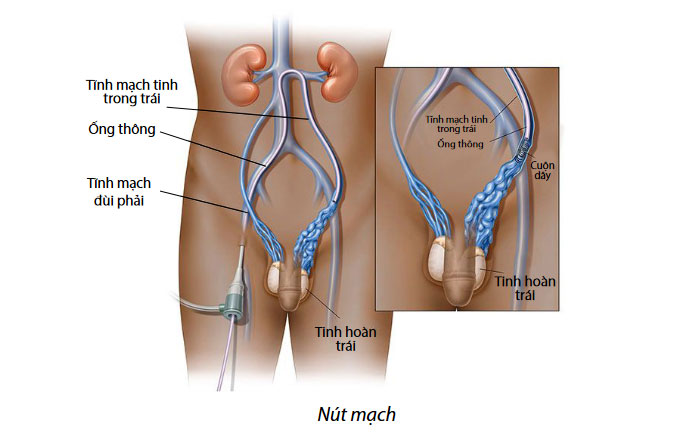
Sau phẫu thuật hoặc nút mạch
Hai ngày sau phẫu thuật, bệnh nhân có thể trở lại các hoạt động bình thường, không hoạt động gắng sức. Sau đó, bệnh nhân có thể trở lại các hoạt động gắng sức nếu không cảm thấy khó chịu, như tập thể dục sau 2-4 tuần nếu phẫu thuật hoặc sau 7-10 ngày nếu thực hiện nút mạch.
Phẫu thuật này thường đau nhẹ nhưng có thể kéo dài trong vài ngày hoặc vài tuần. Bác sĩ có thể kê đơn thuốc giảm đau trong một khoảng thời gian nhất định sau phẫu thuật. Mặc quần lót tam giác hoặc quần lót dây cũng có thể giúp giảm áp lực cho tinh hoàn.
Bệnh nhân sẽ mất vài tháng sau phẫu thuật để có thể thấy sự cải thiện của chất lượng tinh trùng qua tinh dịch đồ. điều này là do mất khoảng 3 đến 4 tháng để hình thành tinh trùng mới.
Bệnh viện An Việt: Địa chỉ điều trị giãn tĩnh mạch thừng tinh uy tín, hiệu quả, tiết kiệm chi phí:
Nếu đang có những dấu hiệu khó chịu liên quan tới bệnh lýgiãn tĩnh mạch thừng tinh, các bạn có thể lựa chọn Bệnh viện Đa khoa An Việt tại số 1E Trường Chinh, Thanh Xuân, Hà Nội. Đây là cơ sở Y tế tin cậy, được đông đảo khách hàng lựa chọn.
Tại Bệnh viện An Việt, quy trình được thực hiện đảm bảo tối đa an toàn, hiệu quả:
- Phác đồ điều trị hiệu quả, phù hợp với từng trường hợp bệnh: Bệnh viện An Việt áp dụng điều trị cả phương pháp nội khoa và ngoại khoa.
- Đội ngũ bác sĩ giỏi: An Việt sở hữu đội ngũ bác sĩ giàu kinh nghiệm, chuyên môn giỏi với nhiều năm công tác tại các bệnh viện lớn như: Bệnh viện Đa khoa Xanh-Pôn, Bệnh viện Việt Đức,…
- Trang thiết bị máy móc hiện đại: Nhằm phục vụ cho quá trình khám chữa bệnh an toàn, chính xác, đạt hiệu quả cao, An Việt trang bị hệ thống máy móc hiện đại: Máy xét nghiệm máu tự động với 24 thông số, máy siêu âm 4D, máy cao tần phục vụ điều trị các bệnh lý.
- Chi phí khám chữa bệnh hợp lý: Tại Bệnh viện An Việt chi phí thăm khám đều được bệnh viện công khai, minh bạch trước khi bệnh nhân đặt lịch khám. Sau khi chẩn đoán và tư vấn phương pháp điều trị bác sĩ sẽ thông báo toàn bộ chi phí cụ thể để bệnh nhân nắm rõ. Do đó, khách hàng hoàn toàn có thể chủ động trong suốt quá trình khám chữa bệnh của mình.
- Hỗ trợ thanh toán bảo hiểm: An Việt hỗ trợ thanh toán bảo hiểm lên tới 100% tùy thuộc vào từng loại mà bệnh nhân tham gia. Đảm bảo thực hiện thủ tục nhanh chóng, đúng quy định.
- Tính bảo mật cao: Khi thăm khám tại bệnh viện, tất cả thông tin của bệnh nhân đều được bệnh viện bảo mật tuyệt đối. Mọi thủ tục, hồ sơ bệnh án đều phải được sự đồng ý của bệnh nhân.
- Hỗ trợ tư vấn online tận tình: Để đảm bảo chất lượng dịch vụ tốt nhất, An Việt hỗ trợ giải đáp qua điện thoại, tin nhắn cho khách hàng miễn phí. Bệnh nhân có thể đặt lịch online để được hỗ trợ sắp xếp thời gian khám hợp lý.
Ngay bây giờ, nếu bạn đang cần tư vấn về bệnh lý tuyến tiền liệt, đừng ngại gọi tới 1900 2838 – 0965 98 37 73 để được hỗ trợ.
——————————————-
BỆNH VIỆN ĐA KHOA AN VIỆT
Địa chỉ: 1E Trường Chinh, Thanh Xuân, Hà Nội
Hotline: 1900 28 38 – 0965 98 37 73
Website: www.benhvienanviet.com
Fanpage: https://www.facebook.com/benhvienanviet
Tải APP Bệnh viện An Việt để “Tra cứu kết quả – Đặt lịch khám – Video Call với bác sĩ” và hơn thế nữa : https://onelink.to/pjmasd


